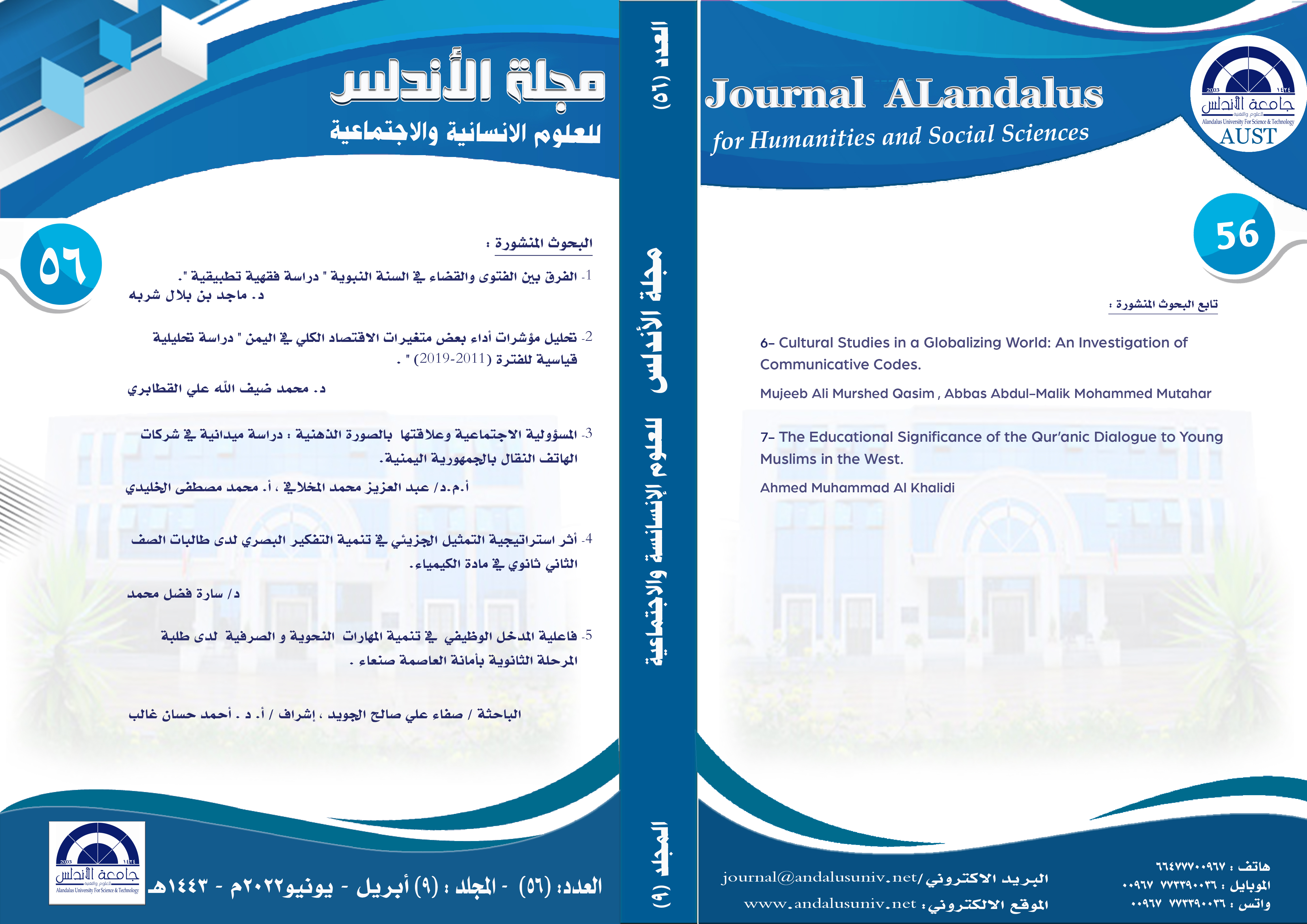الدلالات التربوية للحوارات القرآنية لفتيان المسلمين في الغرب Muhammad Al Khalidi Ahmed
محتوى المقالة الرئيسي
الملخص
هدفت الدراسة إلى تزويد فتيان المسلمين الذين يعيشون في الغرب والبيئات غير الإسلامية الأخرى بدروس ومبادئ وقيم تربوية قرآنية، ولتحقيق أهداف البحث استخدم الباحث المنهج الوصفي (تحليل المحتوى) بأسلوب الاستقراء، من خلال دراسة الحوارات القرآنية الكريمة: (الحوار التبادلي، والحوار الخطابي) واستخلاص القيم والمبادئ الإسلامية، واستخلاص دلالات ودروس تربوية قرآنية ومبادئ وقيم قرآنية، تم تصنيفها إلى الفئات الست الآتية: الروحية، المعرفية، الأخلاقية، الاجتماعية والتربوية والاقتصادية، وقد صنفت الحوارات القرآنية إلى سبعة فئات: الفئة الأولى تتناول موضوع العلم، أما الفئة الثانية تعالج مسألة البعث، والفئة الثالثة تتناول القيم الروحية مقابل القيم المادية، والفئة الرابعة تبرز الأسس ألأخلاقية والقواعد الاجتماعية المستمدة من التوجيه الرباني في نصوص الحوارات القرآنية، والفئة الخامسة تبين دعوة الأنبياء لأقوامهم، والفئة السادسة تشمل حوارات يوم القيامة، وأما الفئة السابعة فتضم الحوارات الخطابية الربانية الموجهة للنبي محمد (صلى الله عليه وسلم).
وتوصلت الدراسة إلى عدة نتائج تحقق لفتيان المسلمين كثير من الفوائد أهمها:
اكتساب هداية ومعرفة قرآنية وفيرة.
تمثل السلوك والقيم والمبادئ الأخلاقية الإسلامية المستمدة من القران الكريم.
أساليب قرآنية كافية للتكيف اجتماعيا في مجتمع متعدد الثقافات دون فقدان مبادئ الدين.
مهارات اتصال مقنعة تمكنهم من مخاطبة ومحاورة المسلمين وغير المسلمين بأسلوب ودي، مقنع ومؤثر.
دروس أخلاقية تزودهم بالحصانة ضد التأثيرات الثقافية السلبية والقدرة على دحض الادعاءات الزائفة ضد التعاليم الإسلامية.
الكلمات المفتاحية: القرآن الكريم، الحوارات القرآنية، الدلالات التربوية، القيم الأخلاقية، المبادئ الإسلامية، فتيان المسلمين.
تفاصيل المقالة
المراجع
Abu-Shuraikh, S. T. (2005). “The Educational Principles and Psychological Fundamentals in the Holy Qur’anic Storytelling.” Amman Printer, Amman.
Ajmi M. A. (2001). “Islamic Education Rules and Applications." International Centre for publication, Riyad.
Albani, A. R. (1983). “Entrance to Education in the Light of Islam.” Islamic Office, Riyadh.
Ali, A. (1934). “Translation and commentary of The Glorious Kur’an.” Dar AL Fikr, Beirut.
Ammoush, K. (2005). “The Qur’anic Speech (A study in the relation between the text and context)." Hashimite University, Irbid.
Ashi, A. (2007). “Dialogue Between Muslims and People of Scriptures.” Journal of Social Studies. Volume 13, No. 25, Sana’a.
Atiyeh, K. M. (2000). “Parables and Brief Biographies.” Makkah Bookshop, Makkah.
Baz, A. (2007). “The Educational Interpretation of the Holy Qu'ran.” Dar AL-Nashr for Universities, Cairo.
Farahat, M. M. (1994) “Preventive Education in Face of Disasters and its Features in Islamic Origins.” Dar AL Mandhoma, Riyadh.
Ghaili, A. M. (2003). “How Does The Qu'ran Programme Life?” Dar AL-Nashr for Universities, Sana’a.
Hilali, M. T. etal. (1983). “Translation of the Meanings of The Noble Qu'ran.” King Fahd Complex for the Printing of The Holy Qu'ran, Al Madinah Al Monawarah.
Jam'an, H. A. etal. (2016). “The Holy Qu'ran Reflection and Work.” AL Menhaj Centre for Educational Supervision and Training, Riyadh.
Khalidi, S. A. (1989). “Along with Predecessors' Stories in the Holy Qu'ran.” Dar AL Basha'er, Damascus.
Maghamsi, S. B. (2004). “Education by Dialogue.” Dar Alwatan for Publication Mawlawi, Jeddah.
Nahlawi, A. R. (2004). “Fundamentals of Islamic Education.” Dar AL Fikr AL Mu'aser, Beirut.
Othman, H. I. (2004). “Fundamentals of Dispute and Debate in The Book and Sunneh.” Majd for Publication, Beirut.
Rajab, M. (2008). "Research in Qur’anic Education." AL Ameriah Alexandria, Egypt.
Rahil B. in Al Taj A. M. (2008). “Status of woman in the West.” Bayan magazine, No. 150. Sana'a.
Saboni, M. A. (1981). “Safawat AL-Tafasir.” The Holy Qu'ran Publishers, Beirut.
Sa’di, A. R. (1995). “Tafsir Alkarim Al Rahman." AL Bayan Magazine, Riyadh.
Safadi, Ahmed Issam (1992). “Fundamentals of Education in Islam/Concepts and Rules.” Conference Article. King Saoud University and the Saudi Association for Educational Sciences and Psychology, Riyadh.
Shaker, M. M. (2006). “On the way of our culture.” Dar Al Madani, Jeddah.
Shershal, A. B. A. (2001). “The Sources of Education and Teaching and their effect on building up personality and its balance as prescribed in the Holy Qur’an.” Al Sirat Magazine, University of Algeria, Algeria.
Tom, B. H. (1990) “The way for building up Islamic Educational Thought for the Educator.” Educational and Psychological Research Centre, Omm Al Qura University, Makkah.
Valiante. (1986). http//www.the modern religion.com family/challenges.
Zeidan, A. K. (1998). "Al-Mustafad from Qur’anic Stories." Al Resaleh Publishers, Beirut.

